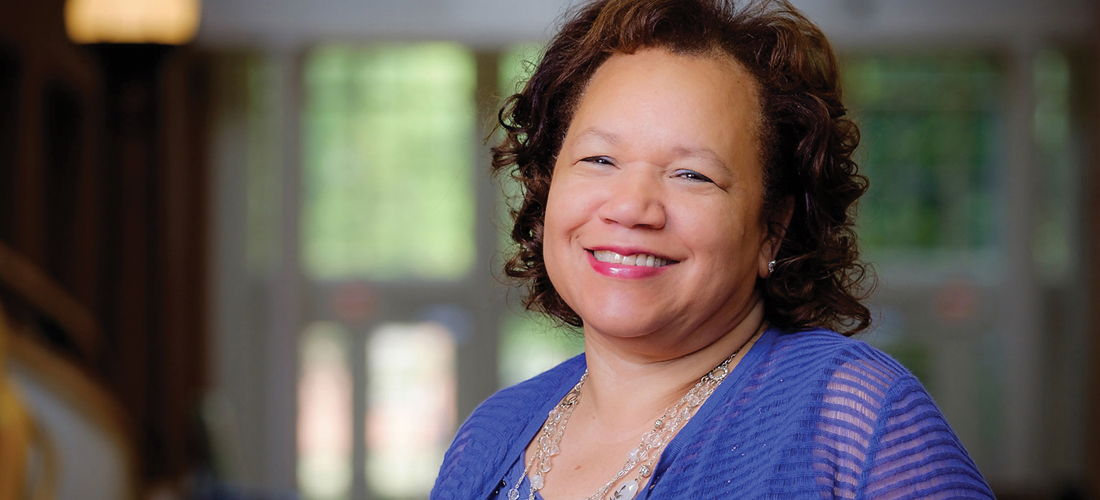
The Book Lover
The American Library Association taps Triad local Wanda Brown as its next president
By Cynthia Adams
Wanda Brown, recently installed president-elect of the American Library Association, has spent her lifetime observing the power of the written word. Director of library services at Winston-Salem State University, Brown says that “stories shape the lens of how you view life.” Now, she is training her lens upon a new kind of public library, and Brown will use the ALA’s international platform to become an agent of that change.
A lifelong love of stories and storytelling is only one source of Brown’s progressive vision for libraries, which casts them as the vibrant heart of community life.
In a changing community dynamic, libraries are thrust into roles requiring them to be much more than repositories of books and periodicals. Today, they are pressed into a far different kind of public service, a fact made evident by librarians like Brown.
Libraries provide enrichment for the mind and physical shelter during storms and extremes of weather — oftentimes a safe harbor for those with nowhere else to go and no place to belong.
“I think that our community would be stronger if libraries took the lead,” Brown says. “Libraries are all about being open and welcoming and inclusive, committed to making a difference.”
Belonging is a common thread in Brown’s personal narrative. She says she “carries a great story within her,” and it is one borne of hardship. It has uniquely equipped her for a role for which she seems destined. Her personal story is underscored with determination to prove herself — a familiar prescription for high achievers.
Brown grew up during the 1950s in a foster home down east in Elizabethtown, N.C. Her father learned to read alongside her and her brother at the kitchen table. “My mother and father were older, they were 50, and kind of rigid. But my father valued education. He couldn’t read when he first adopted us; his mother had died and he had to go into the fields and work as a child. When I came home, with my books, he would sit with me. I watched him teach himself how to read.”
She ascended from difficult beginnings to become an accomplished faculty member and associate dean at Z. Smith Reynolds Library at Wake Forest University, having earned her graduate degree — as a working adult with a young child — in Library and Information Science from UNCG.
In 2016, she assumed the position of director at C.G. O’Kelly Library at Winston-Salem State, the same institution where she had graduated with a B.A. in English (of course) and psychology in 1977. Brown describes that move as “coming home.” As she tells it, she was thrilled to come full circle, to the place where her journey with higher education began. Here at WSSU, she felt she could make the impact that she craved most.
“I always had the dream, that if I was going to be a director, I wanted to be a director at Winston-Salem State . . . to make a difference in students who looked like me.”
As a biracial 6-year-old child, whose white birth mother placed her with the family who would adopt her and her younger brother, Brown developed a drive to succeed — “Maybe subconsciously to prove a value or worth,” she explains, as she was preparing to leave for New Orleans to accept the ALA presidency, one of the highest roles a librarian can attain. (It is also an honor determined by her peers.)
“No child who is adopted doesn’t have those moments,” she adds, describing how she struggled with the pain of abandonment.
“Either way, I am now committed to helping those around me and helping those who cannot help themselves.” With the ALA behind her, she has a forum to do so.
Brown is the first librarian from a historically Black college or university to become the ALA president. The ALA was founded in 1876 during the Centennial Exposition in Philadelphia. It now has an international reach with nearly 60,000 members around the world.
Books, of course, are the currency of any librarian, and Brown’s favorite writer is Carole Boston Weatherford, an African-American author who now lives in North Carolina. But she doesn’t hesitate to name her personal favorite novel.
“The very best book I’ve read in my life was The Secret Life of Bees, by Sue Monk Kidd,” she says, stressing that she related to the themes of loss and love. “Although, most of the things I read are leadership things, self-help, the Harvard Business Review. I enjoy reading.”
She has taken on many professional leadership roles. During her career, Brown had served as the president of both the North Carolina Library Association and the Black Caucus of the ALA. She was the 2015 recipient of the DEMCO/Black Caucus Award for Excellence in Librarianship and the 2013 University of North Carolina-Greensboro School of Education’s Outstanding Alumni Achievement Award.
But now, Brown has a rare and global reach in her newest challenge.
In New Orleans, Brown was thrust onto a national stage, surrounded by a surprising number of famous writers and luminaries, including former First Lady Michelle Obama.
When the ALA convened in late June the opening address was delivered by Obama, whose memoir Becoming will be released in November this year.
Other celebrity authors attending the ALA meeting included actors Sally Field, Doris Kearns Goodwin and Viola Davis. The ALA’s agenda included filmmaker and writer Emilio Estevez, whose new film, The Public, was screened.
The film, which stars Alec Baldwin, Jeffrey Wright and Taylor Schilling, along with actual patrons of the Cincinnati public library, had multiple screenings during the ALA meeting. It speaks to the complicated role of public libraries, depicting precisely how the Cincinnati library’s patrons, many of them homeless, seek shelter among its stacks and reading rooms when the city is hit with “a bitter Arctic blast.”
As Estevez dramatically illustrates, the patrons and library staff have forged personal relationships. After the ALA screenings, he moderated discussions of the film along with the director of a homeless shelter, underscoring the broader civic responsibility of public institutions.
The emerging role of a library as sanctuary is a growing focus for librarians like Brown who are thrust into social action. She envisions summer academies based in libraries, where children in need can have a sandwich and also find mental and psychological nourishment.
“We must reach across the community to say, ‘There are students in the classroom where the love of learning is being so washed from them by third grade, it’s no wonder they are in prison by 13.’ If those young boys are identified in second or third grade as potentially in trouble, the public libraries say, ‘Hey, we’ll bring the basketball players in, we’ll have them eat some, play some, read some, and have an academy. Right here!’”
Learning, too, is a crucial form of nourishment. Even more than books, Brown insists that “my greatest love is people. So, I do think that has been the driving force in my life, a desire to give.”
Deprivation has inspired Brown’s sense of generosity, imparting a worldview that is compassionate and inclusive. She firmly believes her early struggle has taught her lessons in empathy and the pain of exclusion.
To that end, new initiatives for ALA will address becoming inclusive, says Brown.
“The primary emphasis was the profession itself is not diverse. I would love to have something around diversity and inclusion. We, the ALA, do awesome things, but I don’t think we tell our stories enough, and make people aware of the differences we make in the communities we serve.” OH
Cynthia Adams (inklyadams@aol.com) worked in the Walter Clinton Jackson library at UNCG as a student in the 1970s, when only the librarians could access the Internet, searches were charged by the page and the card catalog was crucial. Social action? Not so much.





